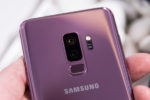Samsung has put out earnings guidance for its Q2 which indicate quarterly growth at its slowest for more than a year — as a lack of new ideas to sell high end smartphones drags on the company’s bottom line.
The electronics maker is reporting estimated profit of 14.8 trillion Korean won (USD$13.2BN) on revenue of 58 trillion Korean won (USD$51.9BN) for the quarter.
Samsung’s expectation just misses an average estimate of 14.9 trillion won from 18 analysts polled by Thomson Reuters, and shares in the company are down just over 2 per cent on the earnings guidance news.
The Q2 forecast compares to profit of 15.64 trillion Korean Won (USD$14BN) on revenue of 60.56 trillion Korean Won (USD$54.2BN) for its Q1 — when Samsung reported a record operating profit off the back of growth in its semiconductor business plus the early global launch of its flagship Galaxy S9 smartphone.
Despite that Q1 high, it had prepared investors for a Q2 slowdown — warning in April of challenging conditions ahead, citing weakness in the display panel segment and a decline in profitability on the mobile side, amid rising competition in the high-end smartphone segment.
At the same time, the global smartphone market is shrinking — even in China, the erstwhile growth engine for smartphones after Western markets saturated. So Samsung’s smartphone business is facing a dual squeeze from shrinking sales opportunities and rising competition from the likes of China’s Huawei and Xiaomi — two rival Android device makers that have been carving out additional marketshare.
Meanwhile, Samsung’s main rival for high end smartphone profits, Apple, beat analyst estimates of iPhones shipments in its Q2 in May, despite an earlier miss in the holiday quarter — showing the staying power of its high end smartphone brand and a positive, if slow burn, response to how it’s iterating its mobile business, with the iPhone X.
Returning to Samsung, the positive story for the company — continued record growth for its chip business — is still not filling the smartphone-shaped profit hole in its books, even as restarting momentum in the smartphone segment is looking increasingly tough in a very tough market.
The Galaxy S9 is a solid smartphone but serving up more of the same equals diminishing returns in the fiercely competitive Android space. And investors look circumspect, with shares in Samsung down around 12% this year.
One wild card on the device innovation front: Samsung has been teasing its R&D work to build a foldable smartphone for multiple years. Ahead of Apple’s iPhone X flagship launch last year Samsung suggested it was targeting 2018 to finally release a product.
However this is also a risky strategy given the obvious manufacturing challenges, and — beyond that — question marks over whether a foldable smartphone is really the type of mainstream innovation that could fire up major momentum among high end handset buyers or be viewed as a niche gimmick.



